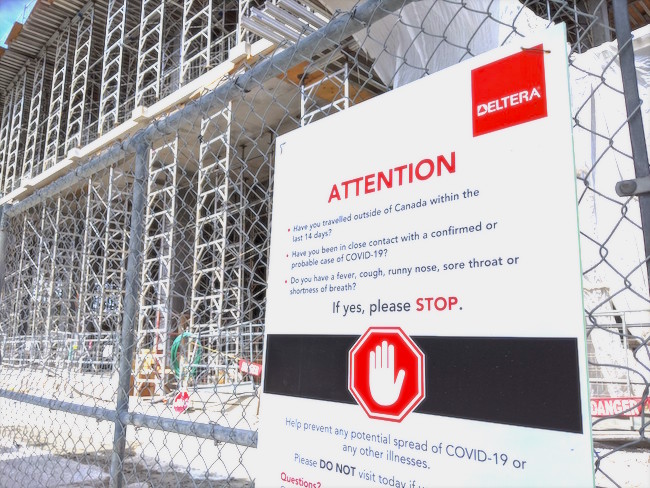
From crisis to recovery: The emerging landscape for estimating, budgets and outcome construction costs
By Arif Ghaffur, FRICS
Construction COVID-19
As the construction industry takes steps to get back to work, it’s unlikely be to business as usual. A range of new norms are expected to emerge
The discussion about opening up the Canadian economy continues in parallel with an increasing desire to get back to business, albeit indications are that it is not going to be “business as usual.” There is recognition that the transition from the crisis to recovery phase is likely to be tinged with bumps as there are recurrences of the pandemic. One thing is constant though: the concern about the impact on construction contracts and the supply chain across broader construction without segregating between the public or private sector or any particular type of construction.
There has been much written over the last few weeks that lays out the likely impacts on the construction industry, particularly as some stakeholders seek to boost economic confidence during a backdrop of economic upheaval. However, there is general consensus the ongoing impact on construction has greatly varied depending on the type of work and the geographic location of the work being planned or being carried out. There is no doubt that in some instances the impact will be unprecedented and may result in significantly altered construction costs.
Irrespective of the type of construction work or the location, there is an understanding the supply chain has been impacted and the costs of resources (materials, labour, equipment, etc.) continue to change. These effects are not always readily captured in cost databases, or cost reference libraries. The impacts on projects, regardless of whether they are critical, non-critical or in the public or private sectors, very much depends upon the extent of disruptions to the supply chain and at what stage they are in the overall project life cycle.
PROJECTS PLANNED
These are projects for which estimates have been developed, budgets approved and are waiting to hit the ground and be constructed. The estimates for these projects may have been provided based on accuracy ranges as established in preset guidelines. For example, as set out by the Canadian Institute of Quantity Surveyors (CIQS) within the percentage accuracy guidelines of itemized Class A — pre-tender cost estimate based on the client’s approved pre-tender contract drawings and specifications being plus or minus five per cent. The reality for these projects is that the estimates may simply now be out of date due to the changes in the supply chain dynamics and pricing.
PROJECTS UNDERWAY
These are projects where construction has started, whether that is shovels in the ground or engineering/mobilization that has followed sanctioning of the project. These projects can be advanced to a stage where construction is substantially complete, and the parties are resolving any remaining commercial or financial aspects such as changes and claims. The very nature of this pandemic is leading to delays in meeting schedule requirements and will lead to projects being prolonged/delayed and parties looking for schedule relief.
IMPACT COSTS
As advocated by the Canadian Construction Association, there is a need to address items that will directly impact project costs such as those for additional health and safety; site security and maintenance; general conditions; extra insurance and bonding; demobilization costs for the prime contractor, subcontractors, suppliers and manufacturers; costs incurred to maintain reasonable delivery dates for project materials and equipment, including cost premiums for alternatively sourced material due to supply chain interruptions.
In addition to the above extraordinary circumstances, there will be additional costs to make up lost and reduced productivity due to, additional time devoted to cleaning and protective activities; compliance activities and briefings, physical distancing and related measures; extended project and site rentals; project-related overhead costs; reasonable remobilization costs; and such other COVID-19 related costs as recommended by public health authorities.
PROJECT OUTTURN
This is like no previous downturn or rebound, any scenario mapping will be hypothetical and cost instability will continue. The previous impact of world events such as the 2008/2009 financial crisis led to stabilization in construction costs with little or no increases over an approximately two-year period followed by significant upward spikes. This will, in my view, be different due to the level of world supply chain disruption which will lead to inconsistent pricing and costs that are fluid with high and increasing levels of uncertainty. This will require the supply chain to collaborate and necessitate a high level of cost awareness and cost control diligence.
There will likely be a new and emerging norm where preparing risk-assessed estimates and establishing coherent budgets that do not solely rely on contemporary cost data will become commonplace. Accurately tracking outturn costs will become increasingly important as there is a higher level of scrutiny of project estimates, budgets and construction costs.
Are we approaching the days where there will be an increase in cost based, open book contracting with a focus on greater collaboration due to cost uncertainty resulting from the inconsistent pricing of risk in stipulated type contracts? Expect estimating, budgets and outcome construction costs to be a topic of necessary interest.
Arif Ghaffur, FRICS, is the President of Lakeland Consulting Inc., a provider of commercial management expertise. Arif is also the Editor of the Construction Economist, a publication of the Canadian Institute of Quantity Surveyors (CIQS). Arif is a Director of the CIQS, Director of the Canada Board of RICS and the Board of the Canada Branch of the Chartered Institute of Arbitrators (CIArb). Arif is a Professional and Chartered Quantity Surveyor and has worked in the United Kingdom, Hong Kong, and has been in Canada since 2001.





